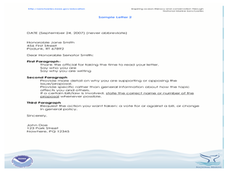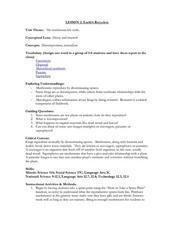NOAA
Stressed Out!
Are our oceans really suffering due to the choices humans make? The sixth and final installment in the volume of activities challenges research groups to tackle one of six major topics that impact ocean health. After getting to the...
Curated OER
Life is Weird
Separate your science class into small groups and assign each a specific deep-sea organism to research. The class will learn about all of the organisms as each group presents their assigned animal. Following their presentations, you can...
Curated OER
What is Life?
Students investigate living and non-living organisms/objects foudn around the school in this technology-based science lesson. Adjustments to the lesson can be made based upon technological limitations.
Curated OER
Investigating Ocean Life
Sixth graders explore the various forms of ocean life. They research a creature that lives in the ocean. Students use their research information to create a series of HyperStudio stacks about their sea creature.
Curated OER
In My Opinion
Young writers craft letters to the government stating their opinion on different topics. They pick an environmental or ocean issue, research it, and craft their formal persuasive letter. Ensure your learners include supporting facts and...
Curated OER
Home Sweet Home
Students explore marine turtle habitats. Students research one species of marine turtle found in the Gulf of Mexico. They identify plants and animals in the habitat. They create a model or replica using information gathered through their...
Curated OER
Fruits of the Rain Forest
Sixth graders research rain forests and complete activities for the topic. In this rain forest lesson plan, 6th graders learn vocabulary about rain forests and research online for rain forest facts. Students research the layers of the...
Curated OER
Spiders
Students study spiders. In this spider lesson plan, students divide into four study groups, research their topic, and give a report over their findings. The four topics are Characteristics of spiders, life cycles of spiders, fun facts...
Curated OER
Magical Metamorphosis
Sixth graders compare and contrast incomplete and complete metamorphosis using a Venn Diagram. They predict, observe, measure, and record data on the life cycle of mealworms. Students write and illustrate the life cycle of the mealworm....
Curated OER
Introducing Biodiversity
Students investigate biodiversity by creating reports with their classmates. In this ecosystem lesson, students utilize the Internet to research the different types of life in our environment and different locations around the world....
Curated OER
Gwynns Falls
Students investigate the question: What is the impact of urban development and expansion on the health of a decidious forest ecosystem and humans? They examine the issue of land development by responding to a specific scenario and...
Curated OER
Earth's Recyclers
Learners work together in groups to report on different topics related to decomposition. They answer questions and share their answers with the class. They discuss any topic that is unclear.
Curated OER
Development of Industrial New Hampshire
Students work in groups to research and share information about several different topics that were part of the development of Industrial New Hampshire. Students complete five parts of the project which include researching, role playing...
Curated OER
Sweet or Unsweet?
This activity challenges students to make their own judgments about the safety of artificial sweeteners after hands-on study and Internet research, and to support those judgments with carefully considered evidence and reasoning.
Curated OER
How is Atomic Energy Used Today
Students investigate energy sources by examining photographs. In this atomic energy lesson plan, students identify and describe various pictures and how atomic energy is used in them. Students create a presentation demonstrating how...
Curated OER
Bioethics: Where the Future May Take Us
Middle schoolers investigate bioethical issues. In this bioethical issues lesson, students research gene cloning, imaging technologies, transplantation, and other bioethical issues. Middle schoolers share their finding with their...
Curated OER
Bioethics: Where the Future May Take Us
Students analyze ethical issues related to technology, medicine, and reproduction. In this ethics lesson, students research selected bioethics issues and discuss their risks and benefits. Students present their research findings to their...
PBS
America's Infrastructure: Miller Center National Discussion Debate Series
Junior high and high school learners study infrastructure and its relationship to the current economy. They review handouts, watch a PBS clip, and review case studies in order to answer provided questions and role play over their views...
Curated OER
Spacing Out on the Internet
Students explore and locate information about the universe using the Internet.
Curated OER
Great Barrier Reef-Guarding Nemo
Learners explore the Great Barrier Reef. In this environmental stewardship instructional activity, students conduct research regarding the Great Barrier Reef and examine methods to preserve the Reef. Learners apply the RAFT method to...
Curated OER
Search for the Humpback Whale
Students work in teams to research and explore whale adaptations, behavior, migration, habitat, communication, and interactions with humans and present their findings.






















